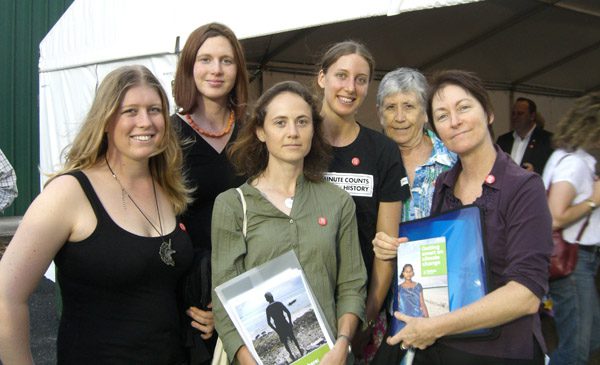
One of the things the world needs most to come out of the Cancún talks, is a global climate fund to help developing countries adapt to the impacts of climate change, build resilience, and support sustainable development. Funding needs to be adequate, transparent, and directly accessible; and should prioritise those who are most vulnerable to climate impacts – and this makes it vital for the voices of women and vulnerable communites to be heard.
This aim is within reach … what will Australia do to make it happen?
While the first international issue that came up in the public forum with Ministers at Sunday’s Community Cabinet concerned the imminent decision on Australia’s bid for the 2022 World Cup; our focus was on the world in which it would be held, and whether we will do all that we can, now, to ensure that it is one in which the Pacific peoples, their oceans and islands can survive.
We were concerned about the 2020s, and about what is happening right now – the real and present dangers that communities in the Pacific and other vulnerable regions face due to shifting seasons, storms and tides, and loss of freshwater, gardens, fish and reefs. This is what vulnerable countries at November’s Tarawa Climate Conference called the ‘immediate term’. This immediacy, of impacts people are experiencing now, and the urgency of our need to act, is exactly what we hoped to convey to the Ministers and our Australian delegation at Cancún.
After the forum, we had the chance to meet face to face with Mark Dreyfus, Parliamentary Secretary for Climate Change and Development, who will soon join the UN talks at Cancún along with Minister Combet. I joined this meeting with Wendy Flannery from Friends of the Earth, who has worked in the Pacific and with Pacific Islanders for more than 20 years, and is passionate about their right to survival of their lands and cultures.
The Government’s stance on several climate issues is still a huge distance from where we need to be – most glaringly in the target for emissions cuts by 2020 of only 5%, which runs counter to any aspirations for limiting climate change to 2 C as professed or 1.5 C as needed, or the need to equitably share the global effort toward any goal.
However, meeting Mark Dreyfus gave me more hope for the negotiations than I had before. He listened and responded with interest and respect, and after realising we were already wired into the action through UN Climate Trackers, he knows that there are many more people who are watching our delegation and actively voicing our concerns – and able to give him some inside views on the ground before he gets there!
We started by speaking about the urgency of limiting climate change, and helping Pacific Islanders to build their resilience and adapt to the impacts they are already experiencing. An essential part of this is a fair global climate fund to enable developing countries to deal with climate impacts and realise their right to sustainable development. This funding needs to be adequate, transparent and accessible, in stark contrast to the tangled web of channels offering meagre resources.
The chance at Cancún to set up a fair climate fund offers an essential opportunity to rebuild trust, to give momentum to global co-operation on climate change, and to give tangible assistance to communities suffering the impacts of climate change – who cannot wait another year for assistance they need now. We hope that a decision will be reached in Cancún that establishes the fund within the UN and sets out a work plan for sourcing long-term financial flows into the fund, and effective distribution to reach those who need it most.
For funds to reach the most vulnerable groups and communities, it is essential that their voices are heard in decision-making at all levels of the climate finance system, and in planning and implementing funded activities. This includes balanced representation of men and women, of developing countries, and civil society participation, acknowledging huge variation in vulnerabilities to climate change, but also the huge scope for women and other vulnerable groups
to play vital roles in resilience and development.
The aim of setting up a fair global climate fund is within reach, if countries including Australia give it the priority it deserves. I hope that Mark Dreyfus will take this call with him. If he needs inspiration or courage, he needs only to look around him at the COP, to see the faces of Ursula Rakova from Tulele Peisa, and the young people from Project Survival Pacific and around the world. The crisis they face with such courage is a crisis we helped to generate, and one we can help to change.
Oxfam estimates that by 2020, at least US$200 billion will be needed each year to limit emissions and enable climate adaptation in developing countries. Other estimates range from 75 to >200 billion per year. Australia’s fair share is US$2.9 bn per year from 2013, US$4.6 bn per year by 2020, based on our historical responsibilities and our capacity to provide funds.
Right now, Australia is a long way from reaching our fair share of financing to meet existing or projected needs. However, this is well within our ability if we support innovative finance sources such as pollution levies on international flights and shipping, and the ‘Robin Hood Tax‘, a tiny tax (0.05%) on fast transactions by financial institutions that could raise billions.
What you can do:
Ask Climate Change Minister Greg Combet and Mark Dreyfus to support the implementation of a global climate fund at Cancun
Jessie Wells is a volunteer with Oxfam Australia